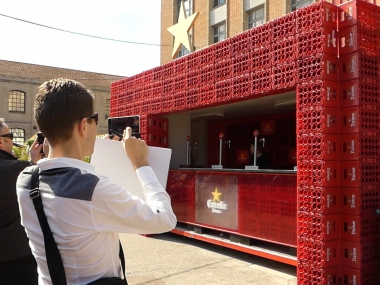"Retail must give life quality". Celebrating our Kick off Meeting in Igualada
Edited on
17 June 2016Igualada hosted a meeting of ten medium-sized cities from different countries in Europe that want to innovate in their commercial offer, within the European project Retailink. The meeting lasted two days and involved forty representatives of ten cities that make part of the Retailink network. Those are: Basingstoke (UK), Fermo (Italy), Hengelo (Netherlands), Hoogeveen (Netherlands), Bistrita (Romania), Sibenik (Croatia), Liberec (Czech Republic), Pécs (Hungary) and Romans (France).

The project is led by the municipality of Igualada and is part of the program URBACT III from the European Union. In the next two years there will be different meetings, so that cities can learn from each other and create Integrated Action Plans to boost their retail sector at local level.
First step: know your consumer
During these days work sessions with experts on the importance of having a retail strategy as city and involve different actors in defining the action plan. New trends in consumption will be discussed as well, as different showcased tools to identify the profile of existing and potential consumers in each city.
As the host of the meeting, Igualada shared some good practices on combining leisure events and retail business: innovative initiatives like Urban Running or Vademercats, and visitors could walk around the REC.0 festival and the Slow -Shopping circuit.
Igualada's Councillor for Economic Promotion, Angels Chacon, stated that, above all, the project aims to be useful: "in the meetings, cities learn a methodology, but afterwards each one has to develop a strategy tailored to their needs". Regarding the impact of the project in Igualada, "we believe that this European project can give us tools that extend our field of view when making decisions that affect our city at strategic and urban planning level". Moreover, "is the best environment to work together with our local stakeholders to define a common strategy."
"Retail must give life quality"
One of the invited experts, ESADE Professor Luis Martínez Ribes, argued that "the retail offer is a reflection of the way of life of a community,". Therefore, the right retail offer for a city is "the one that gives more quality life to the people it serves". To achieve this, “it is important to have information about the people who lives in the area, what are their concerns... and look for how to serve them better, to improve their lives". According to Ribes, it is also very important to consider the impact of smartphones and ICTs: "We can't use the same old tools for a life that goes at a very rapid pace and is constantly evolving".
Meanwhile, Ricardo Rustarazo, also academic from ESADE and founding partner of the consulting firm Retail & Trade, outlined the elements to be taken into account when developing a retail strategy at a city level. Rustarazo highlights three fundamental aspects: "the regulation, legal aspects and urban planning environment; those elements that determine why big brands make the decision to settle in an area; and the city's own strategy, which should include all relevant stakeholders".
 Submitted by Anna Suarez on
Submitted by Anna Suarez on
